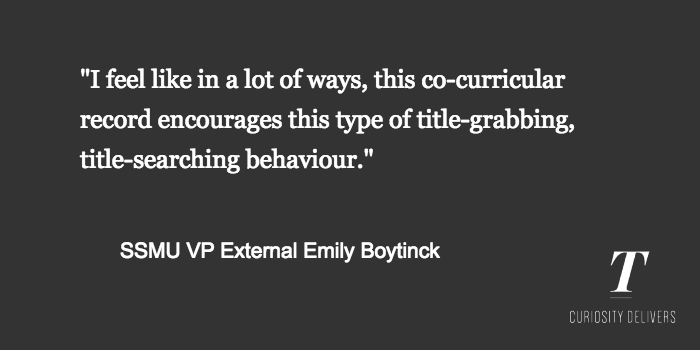Piloted in 2013 by the MyInvolvement division of Student Services, the Co-Curricular Record (CCR) serves as an online tool to help students record their participation in university-sponsored clubs and organizations. MyInvolvement is an online portal that allows McGill students to discover and catalog participation in learning opportunities that take place outside of the classroom. Examples of activities that appear on a CCR include participation on athletics teams, in workshops offered by McGill, positions on executive boards of certain student government councils, and clubs sponsored by the Students’ Society of McGill University (SSMU).
CCR Program Administrator Tim Wilfong explained that the concept is similar to that of a CV, but because it is an official school record, activities listed on the CCR carry official verification from the university.
“The official CCR will have the deputy provost’s signature, so it really is an attestation that these things really happened, that students really participated,” Wilfong said. “It includes volunteering, workshop attendance, peer educator opportunities, varsity athletics, student leadership positions in clubs, student government, etc. and […] awards and scholarships that you’ve received that aren’t on your transcript but [that] the university acknowledges.”
Additionally, Wilfong contended that students can use the CCR as a tool to help write their CV later in their university or post-university careers.
“I think it’s trying to help students to know how to put it on their CV, to find the right words, to think more critically about what they learned, and how they can market it,” he said.
Speaking to SSMU Council on Feb. 11, Wilfong urged departmental councils to spread word of the CCR to all McGill students.
“This is a movement that’s happening across Canada,” he said. “It’s in McGill’s best interest to also be on the cutting edge.”
According to Wilfong, student feedback has been positive thus far.
“The vast majority of students who I’ve talked to about the project that we have are excited about it and really want the record to succeed,” he said. “The student leaders have all been excited to be able to offer recognition to the people who were doing work for them and to get that recognition themselves.”
SSMU Vice-President (VP) External Affairs Emily Boytinck voiced her concern about the type of message that the widespread use of the CCR might send to students.
“My issue with this record is that it is essentially the university saying, ‘This is what we consider a valuable university experience, and this is what we don’t consider to be a valuable university experience,’ and to me, I find that highly limiting,” she said. “I have a lot of concerns with the project just putting additional pressures on students, who are already feeling a lot of pressure to succeed academically, to also feel like they have to fill up this co-curricular record as well.”
Boytinck also argued, however, that the CCR could potentially encourage students to get involved for disingenuous reasons.
“As somebody who’s been involved in student government for a really long time, I’ve chaired a bunch of committees where you know that some people are just on it so they can write something on their resumé,” she said. “I feel like in a lot of ways, this co-curricular record encourages this type of title-grabbing, title-searching behaviour.”
VP Clubs and Services Kimber Bialik brought up the issue of inequity among the recognition of students who devote the majority of their time to a fewer number of projects, versus students who spread small portions over their time among a variety of activities.
“It prioritizes and provides more benefits [to] students who are superficially involved in a number of different organizations at an arm’s length over students who are involved in one initiative but pour much more of their time into the betterment of their chosen project, and treating those two scenarios equally disadvantages the group of students who are often putting more into those smaller number of projects,” she said.
Bialik is equally wary of the CCR’s potential to encourage so-called ‘resumé building.’
“I entirely share the concerns that individuals have raised about the potential for encouraging students to get involved in campus life solely for the purpose of gaining recognition through the Co-Curricular Record,” she said.
According to Wilfong, this problem is not something that is fundamentally caused by the practice of recording one’s co-curricular activities.
“I think that was a problem long before the CCR ever existed,” Wilfong said. “I think it’s kind of a systemic issue within higher education right now, and within the workforce to a certain extent also.”
In spite of these reservations, Bialik ultimately conceded that the CCR is potentially beneficial to student involvement at McGill.
“Unfortunately, these issues are unavoidable,” she said. “Despite my personal reservations about [it…] if the student groups who would be recognized on the [CCR] believe that their inclusion on the project would be beneficial to their group, then I am more than happy to consent to the inclusion of all SSMU groups on the [CCR].”









